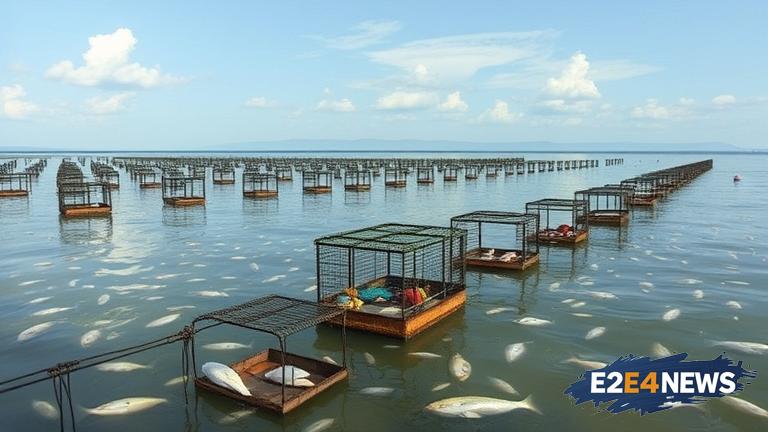Lake Victoria, the largest lake in Africa and the second-largest freshwater lake in the world, is facing a significant threat to its ecosystem due to the rapid expansion of cage fish farming. Experts warn that this practice is a disaster waiting to happen, with potentially devastating consequences for the lake’s biodiversity and the communities that depend on it. The introduction of non-native fish species, such as Nile tilapia, has already led to a decline in the population of native fish species, including the iconic Nile perch. Furthermore, the use of commercial fish feed has resulted in the release of excess nutrients into the lake, contributing to the growth of toxic algae blooms. These blooms can be harmful to both humans and wildlife, causing respiratory problems and even death. In addition, the cages used for fish farming can damage the lake’s shoreline and disrupt the natural habitats of other aquatic species. The expansion of cage fish farming in Lake Victoria is also having a significant impact on the local communities that depend on the lake for their livelihoods. Many small-scale fishermen are struggling to compete with the large-scale commercial fish farms, leading to a decline in their incomes and a loss of traditional fishing practices. Moreover, the increased demand for fish feed and other resources is putting pressure on the local environment, leading to deforestation and soil erosion. Experts are calling for a more sustainable approach to fish farming in Lake Victoria, one that prioritizes the long-term health of the lake’s ecosystem and the well-being of local communities. This could involve the use of more environmentally friendly fish feed, the implementation of stricter regulations on the use of cages, and the promotion of more sustainable fishing practices. However, the Tanzanian government has been criticized for its lack of action in addressing the issue, with many arguing that the country’s fisheries policy is inadequate and in need of reform. The situation is further complicated by the fact that Lake Victoria is a transboundary lake, shared by three countries: Tanzania, Uganda, and Kenya. This makes it difficult to coordinate a response to the crisis, as each country has its own set of priorities and interests. Despite these challenges, there are still opportunities for sustainable fish farming in Lake Victoria. For example, some companies are exploring the use of recirculating aquaculture systems, which can reduce the environmental impact of fish farming by minimizing waste and the use of wild-caught fish. Additionally, there are efforts to promote more sustainable fishing practices, such as catch-and-release fishing and the use of eco-labeling schemes. However, these initiatives are still in their infancy, and more needs to be done to address the scale and complexity of the problem. The clock is ticking, and if action is not taken soon, the consequences for Lake Victoria’s ecosystem and the communities that depend on it could be catastrophic. The lake’s delicate ecosystem is already showing signs of stress, with many species of fish and other aquatic animals facing extinction. The impact on human health is also a concern, as toxic algae blooms and other pollutants can have serious consequences for people who depend on the lake for their drinking water and food. In conclusion, the expansion of cage fish farming in Lake Victoria is a disaster waiting to happen, with potentially devastating consequences for the lake’s ecosystem and the communities that depend on it. It is imperative that the Tanzanian government, along with the governments of Uganda and Kenya, take immediate action to address the issue and promote more sustainable fishing practices. This could involve the implementation of stricter regulations, the promotion of eco-friendly fish feed, and the support of small-scale fishermen and other local communities. Only through a concerted effort can we hope to mitigate the damage that has already been done and ensure a sustainable future for Lake Victoria and its inhabitants.
